Talk to our experts
1800-120-456-456
- Maulana Abul Kalam Azad Biography


Introduction
Move back to the time when India was under British rule, around the period of 1855 that is after the formation of the Indian National Congress. This period has seen the efforts, dedication, and intellectual minds of various moderate leaders like CR Das, Motilal Nehru, Dada Bhai Naroji, and one important name among these names is the ‘Maulana Abdul kalam Azad’.
We Bring You the Autobiographies of the Prominent Leaders To Make You -
Understand the leadership quality they had and learn from these qualities
To imbibe in oneself the same commitment and devotion towards the motherland
To make you admire the fearless attitude that surpasses all storms and surges
To make you learn from their mistake
To make you carry their vision and help build the nation great again.
In This Particular Article, Students Will Learn the Following -
Introduction
Who was Maulana Abdul kalam Azad?
Early History of Maulana’s Life
Maulana and the Congress
Maulana as the Freedom Fighter
Short essay
Task to do
Frequently asked questions
Who is Abdul Kalam Azad?
Abdul kalam Azad, also known as Maulana Abdul kalam Azad or Maulana Azad was an Indian scholar, Islamic theologian, Senior leader of the Indian National Congress during the Indian Independence movement, and an independent activist. He was born on 11 November 1888 in Mecca and his full name is Abdul kalam Ghulam Muhiyuddin Ahmed bin Khairuddin Al-Hussaini Azad. He is commonly known as Maulana Azad where the word Maulana is an honour which means ‘Our Master’ and he adapted Azad as his pen name.
Maulana Abdul Azad was highly respected throughout his Life as he was a man of high integrity. Azad in his teenage year’s composed many poetries in Urdu and also had written much work on religion and philosophy. While he was working as a journalist, he published many articles which criticized British rule which eventually led him to get involved in the Indian independence movement. Maulana Azad also became the leader of the Khilafat movement during which he met the Indian leader Mahatma Gandhi. Maulana Azad was moved by Mahatma Gandhi’s ideas of a non-violence approach to fighting against British rule. He became an enthusiastic supporter of Mahatma Gandhi and also worked to organize the non-co-operation movement in protest of the 1919 Rowlatt Acts. At the age of 35, Maulana Azad became the youngest person to serve as the president of the National Congress.
Without taking the help of the British government. Maulana Azad in October 1920 was elected as a member of the foundation committee to establish the Jamia Millia Islamia at Aligarh in Uttar Pradesh.In 1931, Maulana Azad was the main organizer of the Dharasana Satyagraha.He also was the most important national leader of the independence movement and also helped in establishing the ideas of secularism and socialism in India. He also helped in launching the Quit India rebellion movement and because of that, he was also imprisoned by other Congress members. Maulana Azad also worked on the unity of the Hindu-Muslim community through his Al-Hilal newspaper. He believed that we as Indians if united will help to make India independent from British rule. Let us learn more about who Abdul Kalam Azad is.
Maulana Abdul kalam Azad Information
Abdul kalam Full Name: Sayyid Ghulam Muhiyuddin Ahmed bin Khairuddin Al Hussaini
Abdul kalam Azad Birth Date: 11 November 1888
When did Abdul kalam Die: 22 February 1958
Age (At the Time of Death): 69
Early Life History of Maulana Abdul kalam Azad
Maulana Azad's real name was Sayyid Ghulam Muhiyuddin Ahmed bin Khairuddin Al Hussaini but eventually came to be known as Maulana Abdul kalam Azad. He was born on 11 November 1888 in Makkah. Muhammad Khairuddin was his father and was a Bengali Muslim scholar of Afghan ancestry who wrote twelve books and had thousands of disciplined and claimed noble ancestry while his mother name was Sheikha Alia bint Mohammad, the daughter of Sheikh Mohammad bin Zaher Alwatri who was also a reputed scholar from Medina.
Azad was from an orthodox family background as a result that he pursued traditional Islamic education from the beginning. Maulana Azad settled with his family in Calcutta in 1890 where he was homeschooled and self-taught. He was taught by his father at home and then later as years passed he was taught by teachers from various fields. Maulana Azad was educated and trained to become a clergyman and he wrote many works which also included reinterpreting The Holy Quran. He learned Arabic and Persian languages first during his teens and then learned various subjects such as geometry, mathematics, philosophy, and algebra. He also had a keen interest in world history, English, and politics. Azad was very interested in learning new knowledge and that resulted in him opening a new library, a debating society, and a reading room before he even reached the age of twelve. Azad also wrote a biography on the Life of Al-Ghazali at the age of twelve and was also writing articles for a literary magazine known as Makhzan when he was only fourteen years old. When he was fifteen he started teaching students who were twice his age and also completed the traditional course of study at the age of sixteen. By the year 1990, he was the editor of the weekly magazine called Al-Misbah and by 1903 he brought out the monthly journal named as Lissan-us-Sidq. Maulana Azad also got married to a young Muslim girl, Zulaikha Begum when he 13c years old.
Azad also developed an interest in the pan-Islamic doctrines of Jamaluddin Afghani and also the Aligarh thoughts of Sir Syed Ahmed Khan. Influenced by the Pan -Islamic spirit he visited countries such as Iraq, Egypt, Syria, and Afghanistan to study the doctrines further. In Egypt, he met many Arab revolutionary activists who inspired him to be a national revolutionary.
Maulana Azad as the Congress Leader
Maulana Azad was an inspiring personality in the field of politics. He served in the Congress working committee and also in the offices of the general secretary and the president. In the year 1928 Maulana Azad developed a close friendship with Jawaharlal Nehru and began to support the idea of socialism as he believed that it would help in fighting inequality, poverty, and other national challenges. Maulana Azad was also involved in naming the Muslim political party Majlis-e-Ahrar-ul-Islam. Azad accepted the ideals of Mahatma Gandhi and believed that nonviolence is the only way that India could be independent of British raj and in 1930 when Mahatma Gandhi embarked on the Dandi Salt March that inaugurated the Salt Satyagraha, Maulana Azad was the one who organized and led the national raid in a nonviolent way on the Dharasana salt works to protest against the increasing salt tax and restriction of its sales and production. Because of the Dandi March, the British government had imprisoned many people who participated in it and among all of them, Azad was also imprisoned in jail between the years 1930 to 1934. In the year 1931 Maulana Azad and many other independent activists were released from jail because of the Gandhi-Irwin pact in which Mahatma Gandhi pledged to give up the Salt Satyagraha movement in return for all his comrades to be released from the jail.
Maulana Azad was appointed to organize the Congress election campaign in 1935 when the elections were called under the Government of India Act. Azad also worked on raising funds, selecting trustworthy candidates and also organized volunteers to spread the word of elections, and held many rallies across India which aimed at helping the common people of India understand the importance of the election. In 1936, Maulana Azad backed the idea of Jawaharlal Nehru to be the Congress president and also supported the resolution supporting socialism. Azad again supported the reelection of Nehru in the 1937 election and had organized many campaigns for the same cause. Maulana Azad was in conversation with Jinnah and the Muslim league between the years 1935 and 1937 over the Congress-league coalition and broader political co-operation.
Maulana Azad as the Freedom Fighter
After returning from Egypt, Maulana Azad met two revolutionaries, Aurobindo Ghosh and Sri Shyam Sundar Chakravarty from Bengal. He was inspired to make India Independent of British rule. He joined the revolutionary movement against British rule. The revolutionary activities were restricted to Bihar and Bengal which was not helpful to fight the British as many people did not know about the cause. Maulana Azad within two years was able to set up secret revolutionary centres all over North India and Bombay this helped many people joining the revolutionary movement to fight the British. During this time there was a rumour that the British government was using the Muslim community against India’s Freedom struggle, this caused many of the people who the revolutionary movement to be anti-muslim. Maulana Azad was able to convince his colleagues to shed their hostility towards the Muslims.
In the year 1912, Maulana Abdul kalam Azad started a weekly journal in Urdu called Al-Hilal. The main purpose of this journal was to increase awareness of Independent India and to include more revolutionary recruits from the Muslim community. Due to the Morley-Minto reforms, a bad blood relation was developed between the Hindu-Muslim community but Al-Hilal played an important role in ending the disputes between the Hindu and Muslim communities as it became a revolutionary mouthpiece that helped spread the extremist ideas but later it was banned by the British government in the year 1914. This did not stop Maulana Azad from promoting Indian nationalism as a result of that he started another weekly magazine called as Al-Balagh with the same mission of promoting revolutionary ideas based on Hindu-Muslim unity and also urged people to fight for independent India. In 1916, the British government again banned Al-Balagh and even imprisoned Maulana Azad for four years at Ranchi.
Maulana Azad was released in 1929 from prison and soon after the release, he convinced the Muslim community to fight against the British through the Khilafat Movement. In 1920, Maulana Azad joined the Indian national Congress and in the same year joined the Non-Cooperation Movement started by Mahatma Gandhi. In 1923, Azad was elected as the president of the session of the Congress in Delhi. Azad was arrested and put in the Meerut jail for a year and a half for the violation of the salt laws as part of Mahatma Gandhi’s Salt Satyagraha Movement but after a year he was released. Maulana Azad became the president of the Congress in the year 1940 and remained in the post till 1946. he always was convinced of the idea that India should be a secular democratic country and always worked for the unity of the Hindu-Muslim community. he was against the idea of partition and opposed it but in the end, partition hurt him greatly as it shattered his dream of a unified nation where Muslims and Hindus can coexist and prosper together.
Short Essay on Abdul Kalam Azad
Abdul kalam Azad’s original name was Abdul kalam Ghulam Muhiyuddi and he was also called Maulana Abdul kalam of Maulana Azad. He was born on November 11, 1888, in Mecca.
Azad was the son of Muhammad Khairuddin, an Indian Muslim scholar living in Mecca and his mother was Sheikha Alia bint Mohammad. When he was young his family moved back to India and he received a traditional Islamic education at home from his father and other Islamic scholars. Azad was influenced by the teaching of an Indian educator Sir Sayyid Ahmad Khan and learned English as well.
Maulana Azad at the age of twelve got very much active in journalism. In 1912 he started writing daily journals and also published a weekly Urdu-language journal by the name Al-Hilal in Calcutta. The journal mainly focused on the idea of how the Muslim community can help in fighting against British rule in India. Al-Hilal also criticized the Muslim rulers who were supporting the British government. The journal became very famous among the Muslim community because of its Anti-British idea and because of that, it was banned by the British government. In 1920 he joined the Indian National Congress and helped spread the idea of Independent India among the Indian Muslim community. Between the years 1920 to 1924, he also participated in the Khilafat movement which defended the Ottoman Sultan as the head of the Muslim community.
Maulana Azad became very close to Mahatma Gandhi and was involved in various civil disobedience campaigns which were organized by Gandhi such as the Salt Satyagraha movement. Because he participated in the salt satyagraha movement, he was imprisoned in the year 1920, and later on, he was again prisoned because he participated in the Quit India movement. Maulana Azad also became the president of the Indian Congress Party in the year 1923.
Maulana Azad was one of the leaders who negotiated with the British for Indian independence. He believed in the idea of secular India and worked tirelessly for an India that would embrace the idea of Hindu-Muslim unity. Azad strongly opposed the partition of India and tried to not let the British divide India. He later blamed Mohammed Ali Jinnah and Congress party leaders for the division of the subcontinent. After India got Independence, he served as the minister of education in India from 1947 until 1958. Azad died of a stroke in 1958 and decades after his death Azad was awarded the Bharat Ratna which is India’s highest civilian award.
Since we have learned who Maulana Abdul kalam Azad is, let us look at some frequently asked questions.
The Task to do -
After reading the autobiography, students are required to do a SWOT analysis of the Life of Maulana Abdul Kalam Azad. That is students are required to identify the strengths of Maulana Azad and weaknesses if any you felt Maulana had. Identify the opportunities he had and the threats he faced during all these periods.
This exercise will make you think analytically of the Life of Maula and help you extract the learning you want to take away with you.
Conclusion
Maulana Abdul Kalam Azaad was a renowned poet and scholar. He was very fluent in many languages and was a very good leader as he convinced many people to join the Indian Freedom fight. Azad worked for Indian nationalism and worked for the Hindu-Muslim unity in India. He is not only remembered for his role as the Freedom Fighter for Indian Independence but also as the first education minister of independent India from 1947 to 1948. On February 22, 1958, he passed away due to a stroke. For his invaluable contribution to the nation, Maulana Azad was awarded Bharat Ratna which is India’s highest civilian honour in the year 1992.

FAQs on Maulana Abul Kalam Azad Biography
1. Which post did Maula Abdul Kalam hold after India got Independence?
During the interim government itself Maulana Abdul kalam took charge as Education minister and he remained the education minister until he died in 1958. And thus every year since 2008, on November 11th which is the birth anniversary of Maula Abdul Kalam, we celebrate the Nation Education Day.
2. What are some of the interesting facts about Maula Abdul kalam Azad?
Some of the important facts about Azad are -
He was born in Saudi Arabia and came back to India when he was two years old
He never went to a school and did homeschooling
He knew many languages like Hindi, English, Arabic, Persia, Hindustani, etc
In 1912 he started a weekly journal Al-Hilal, forging Hindu-Muslim unity and also increasing the revolutionary recruits amongst the Muslims
He supported the Non-cooperation movement and joined INC in 1920
In 1940 he became the president of INC and remained as the president till 1946
He founded Jamia Millia Islamia University, in 1920
He shaped the modern education system like IITs, IISc
If you have more interesting facts about Maulana Azad please write in the comment box.
3. What was Maulana Azad’s view on the formation of a separate state of Pakistan?
Maulana was a visionary and opposed the formation of a separate state of Pakistan. As he feared that without a proper constitutional measure the rights of the Muslim minorities would be exploited. And the partition would have left the Muslims in minority in many areas under the tyranny of the majority. Thus, Maulana and Jinnah had contradictory views on the issue of partition.
4. What is the Maulana Abdul Kalam Azad Trophy?
It is a trophy started in the year 1956-57 which is awarded to the overall Top Performing University in Sports of the preceding year. The aim behind giving the trophy is for promoting competitive sports in the university sector and to develop interest among students and motivate them to take up competitive sports.
5. What is the name of the autobiography of Maulana Abdul kalam Azad?
Maulana Abdul kalam Azad was a great writer who wrote the journals Al-Hilal and Al-Balagh. An autobiography was also written with the title ‘India Wins Freedom’.
6. What is Celebrated on Maulana Abul Kalam’s Birthday?
Maulana Abul Kalam was the first education minister of independent India. To celebrate his life and his achievement towards the education system in India every year Azad birthday, November 11 is celebrated as the 'National Education Day'.
7. What are the Contributions of Maulana Abul Kalam Azad?
Maulana Abul Kalam Azad was the first education minister of Independent India. He also contributed to establishing many educational institutions such as Jamia Millia Islamia and the IIT Kharagpur. He was also a strong believer that the women of the country should be educated and also advised that free education should be provided to children up to the age of 14.
- Skip to primary navigation
- Skip to main content
- Skip to primary sidebar
UPSC Coaching, Study Materials, and Mock Exams
Enroll in ClearIAS UPSC Coaching Join Now Log In
Call us: +91-9605741000
Maulana Abul Kalam Azad: Biography
Last updated on February 14, 2022 by ClearIAS Team
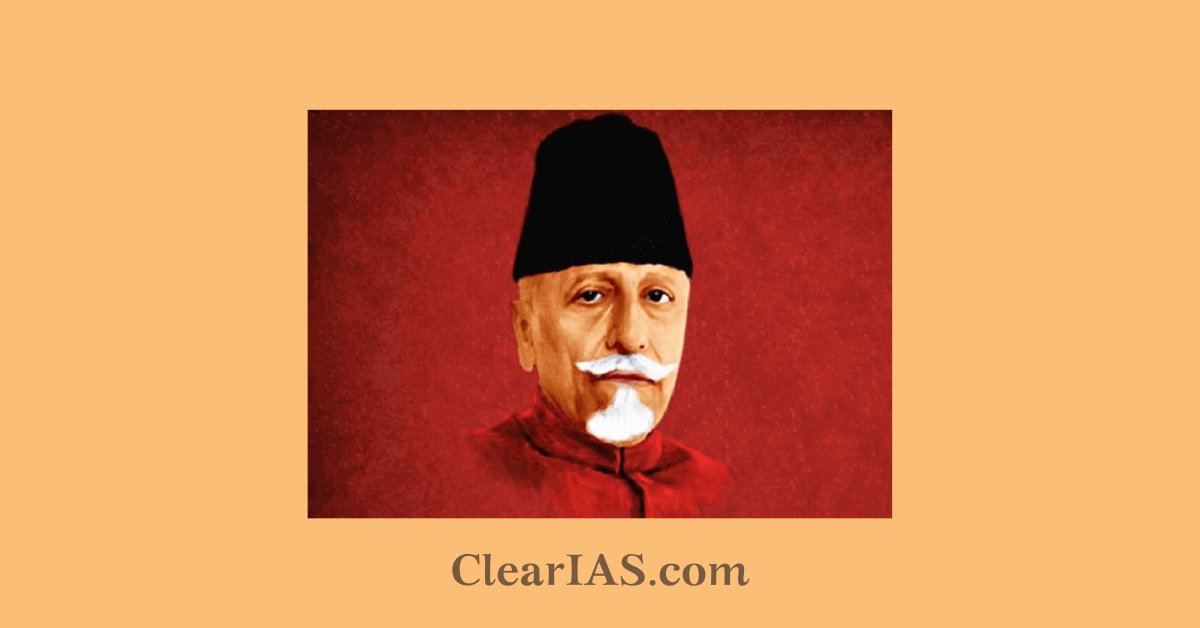
Maulana Abul Kalam Azad was an educationist, freedom fighter, politician, and journalist.
In his more than four-decade-long public life, he left behind a lasting legacy in the field of India’s education.
Intellectual par excellence, his life is a tribute to the importance of education.
Table of Contents
The early life of Abul Kalam Azad
He was originally named Muhiyudin Ahmad and was born in Mecca, Saudi Arabia in 1888, his family relocated to Calcutta (now Kolkata) two years after his birth.
His father was a renowned scholar and his mother came from a family of reputed scholars from Medina.
Education was at the heart of Abul Kalam’s growing up. At home, he studied a variety of languages such as Persian, Urdu, and Arabic, and subjects such as history, philosophy, and geometry.

He was a prolific reader and had mastered is Islamic theology, mathematics, philosophy, and science through books and tutors, as he was homeschooled. He was running a library, a reading room, and a debating society before he was twelve.
Abul Kalam Azad, the Journalist:
Abul Kalam began writing at an early age and started publishing poetry and articles by age of eleven. He wrote under the pen name ‘Azad’, which later became his identity.
In 1912, Azad started publishing a weekly called ‘ Al-Hilal’ which he used to question British policies. The publication gained such immense popularity among the public that the British had to finally ban it in 1914 under the Press Act .
Azad soon started another weekly, ‘ Al-Balagh’ which ran until he was booked under Defence of India Regulations in 1916. The governments of Bombay, Punjab, Delhi, and the United Provinces had banned his entry and he was deported to Bihar until 1920. Despite censoring, he found ways to rebel against British activities through the power of his pen.
He was a proponent of Hindu-Muslim unity and kept views that were radical and liberal for the Muslims of that time. He propagated his views through his writings and advocated for Indian nationalism and revolutionary ideas based on Hindu-Muslim unity.
Abul Kalam Azad during the Independence movement
1905: Azad opposed the Bengal partition of 1905 and became increasingly active in revolutionary activities and was associated with revolutionaries like Aurobindo Ghosh and Shyam Sundar Chakravarty.
1908: Azad’s trip to Egypt, Syria, turkey, and France brought him in contact with many revolutionaries related to the Young Turk movement and the Iranian revolution . This developed and shaped his political views towards nationalism.
1909: He objected to separate electorates for Muslims under the Morley-Minto reforms and wrote extensively against is it in his weekly Al-Hilal.
1916: He was banned and deported to Bihar for his revolutionary writing until 1920. He was released after World War I.
1920: After his release, Azad, already inspired by Mahatma Gandhi ’s philosophy of non-cooperation to fight the British, started leading the Khilafat Movement , launched by Indian Muslims to demand that the British preserve the authority of the Ottoman Sultan as Caliph of Islam after World War I.
He supported the Non-cooperation Movement (1920-22) and entered the Indian National Congress during this time. He was elected the president of the All India Khilafat Committee.
1923: At 35, he became the youngest person to become the president of the Indian National Congress.
Azad grew close to Gandhi through their deep passion for religion and simple living. He began to spin his clothes using khadi on the charkha and began frequently living and participating in the ashrams organized by Gandhi. Though deeply committed to non-violence himself, Azad also grew close to fellow nationalists like Jawaharlal Nehru, Chittaranjan Das, and Subhas Chandra Bose .
1924: Azad served as president of the 1924 Unity Conference in Delhi, using his position to work to reunite the Swarajists and the Khilafat leaders under the common banner of the Congress.
Azad served on the Congress Working Committee and in the offices of the general secretary and president many times.
1928: Azad endorsed the Nehru Report, which was criticized by the Ali brothers and Muhammad Ali Jinnah. Azad endorsed the ending of separate electorates and called for an independent India to be committed to secularism.
At the Congress session in Guwahati, Azad endorsed Gandhi’s call for dominion status for India within a year.
1930: He participated in Salt Satyagraha and was arrested and jailed for a year and a half. He was released after the Gandhi-Irwin pact of 1931.
1936: At the congress session in Lucknow, Azad backed the election of Nehru as Congress president and supported the resolution endorsing socialism.
1938: Azad served as an intermediary between the supporters of and the Congress faction led by Congress president Subhas Bose, who criticized Gandhi for not launching another rebellion against the British.
1940: He again became the president of Congress and remained in the post till 1946.
1942: He along with the rest of the leadership was arrested and put in jail for four years for participating in the Quit India movement.
1944: Azad was against Gandhi Ji holding talks with Jinnah in Mumbai before independence.
Azad was strongly against the Partition of India. He was deeply affected by the violence witnessed during the Partition. Azad travelled through the violence-affected regions of Bengal, Assam, and Punjab and contributed to establishing the refugee camps and ensuring the supply of food and other basic resources.
Abul Kalam Azad, the Educationalist
‘Maulana’, as Azad was fondly referred to, headed constituent assembly debates which went on to shape many of the policies, especially those related to education. He believed that India as a nation should aspire for high educational standards and never compromise on that count.
He was an intellectual at par and his dedication to the field of education is unparalleled as he envisages a liberal and humanitarian education system. His idea was a fusion of eastern and western concepts to bring about wholesome and integrated personality to the education system.
In 1920, Azad along with fellow Khilafat leaders M. A. Ansari and Ajmal Khan founded the Jamila Milia Islamia in Aligarh as higher education institute managed entirely by Indians without any British support.
Life of Abul Kalam after independence
Azad remained a close confidante, supporter, and advisor to prime minister Nehru, and played an important role in framing national policies. Azad masterminded the creation of national programs of school and college construction and spreading the enrolment of children and young adults into schools, to promote universal primary education.
He was elected to the Lok sabha in 1952 and 1957.
Azad supported Nehru’s socialist economic and industrial policies, as well as the advancing social rights and economic opportunities for women and underprivileged Indians.
In 1956, he served as president of the UNESCO General Conference held in Delhi.
Maulana Azad was strongly against leaving education to the states. He argued that education was a matter of grave importance and the central government should be given this authority to ensure a uniform national standard of education across the country.
Though he was supported by Jawaharlal Nehru and other key members of the constituent assembly, a few felt this was a bad idea given the diversity of our country. They were of the view that a decentralized approach would enable states to make laws about education in their respective states. Ultimately, the issue was resolved by retaining education in the state list but also including entries related to higher education under the union list.
Education always remained an important issue for Azad. On 16 January 1948, Azad had said in a meeting, “ We must not for a moment forget, it is a birthright of every individual to receive at least the basic education without which he cannot fully discharge his duties as a citizen.”
He also established ‘the board for adult education to facilitate education among the uneducated adults.
He founded the Indian Council of Cultural Relations in 1950 to encourage cultural exchange with other nations.
He also played an important role in establishing the Sahitya Academy, Sangeet Natak Academy, and Lalit Kala Academy for the development of literature, music, dance, and painting respectively.
Azad, the first education minister of independent India
As the first education minister of the country from 1947 to 1958, Abul Kalam Azad advocated for free and compulsory primary education for all children up to the age of 14 as he believed it was the right of all citizens.
Later, he went on to establish the Jamia Millia Islamia in Delhi in 1935 from Aligarh and contributed to the setting up of the IITs, IISc, and School of Planning and Architecture.
He was also one of the brains behind the University Grants Commission, India’s higher education regulator, and played a key role in the establishment of other educational institutions.
Literary works by Azad
He wrote many books like India wins Freedom, Gubhar-e-Khatir, Tazkirah, Tarjumanul Quran, etc.
Death of Abul Kalam Azad
The scholar-politician passed away on 22 February 1958.
Legacy of Maulana Abul Kalam Azad
Maulana Abul Kalam Azad was a strong believer in the co-existence of all religious communities.
His contributions to the field of education in India are incomparable, hence his birthday, 11 November, is celebrated as National Education Day.
In 1992, he was posthumously conferred the Bharat Ratna, India’s highest civilian award.
The Ministry of Minority Affairs of the Central Government of India set up the Maulana Azad Education Foundation in 1989 on the occasion of his birth centenary to promote education amongst educationally backward sections of the Society.
The Ministry also provides the Maulana Abul Kalam Azad National Fellowship, an integrated five-year fellowship in the form of financial assistance to students from minority communities to pursue higher studies such as M. Phil and PhD.

Aim IAS, IPS, or IFS?
Elevate your preparation from today, take clearias prelims mock tests, ⟹ analyze progress, ⟹ all-india ranking, ⟹ negative marking.
Take Test Now

About ClearIAS Team
ClearIAS is one of the most trusted online learning platforms in India for UPSC preparation. Around 1 million aspirants learn from the ClearIAS every month.
Our training methods are different from traditional coaching. We give special emphasis on smart work and personal mentorship. Many UPSC toppers thank ClearIAS for our role in their success.
Download the ClearIAS mobile apps now to supplement your self-study efforts with ClearIAS smart-study training.
Don’t lose out without playing the right game!
Follow the ClearIAS Prelims cum Mains (PCM) Integrated Approach.
Join ClearIAS PCM Course Now
UPSC Online Preparation
- Union Public Service Commission (UPSC)
- Indian Administrative Service (IAS)
- Indian Police Service (IPS)
- IAS Exam Eligibility
- UPSC Free Study Materials
- UPSC Exam Guidance
- UPSC Prelims Test Series
- UPSC Syllabus
- UPSC Online
- UPSC Prelims
- UPSC Interview
- UPSC Toppers
- UPSC Previous Year Qns
- UPSC Age Calculator
- UPSC Calendar 2024
- About ClearIAS
- ClearIAS Programs
- ClearIAS Fee Structure
- IAS Coaching
- UPSC Coaching
- UPSC Online Coaching
- ClearIAS Blog
- Important Updates
- Announcements
- Book Review
- ClearIAS App
- Work with us
- Advertise with us
- Privacy Policy
- Terms and Conditions
- Talk to Your Mentor
Featured on

and many more...

History of Islam
An encyclopedia of Islamic history
Maulana Abul Kalam Azad
Maulana Abul Kalam Azad (1888-1958) – The Man and his Pen.
By Professor Nazeer Ahmed
He was a giant in the shadows of other giants. Living as he did in an age dominated by Gandhi, Jinnah and Nehru, Maulana Azad nonetheless left his own imprint on the history of South Asia. The twentieth century would not be the same without him. Paying tribute to his versatile genius, Nayaz Fatehpuri wrote:
“If he had focused on Arabic poetry, he would be a Mutanabbi and Badi uz Zaman. If he had taken on the reformation of law and religion, he would be the Ibn Taimiya of his age. If he had dedicated himself to philosophy, he would be no less of a peripatetic philosopher than Ibn Rushd and Ibn Tufail. If he had turned his attention to Farsi poetry and literature, he would find a place along with Urfi and Nazeeri. If we was inclined towards Tasawwuf and renovation, he would be no less than al Gazzali and Rumi. And if he had taken on applied Shariah, he would be a Wasi Bin Atta…..”
Born in 1888 in Mecca in a family of scholars, he was given the name Abul Kalam Ghulam Mohiyuddin Ahmed. In 1890 the family returned to Kolkata where his father, Maulana Khairuddin, had established a reputation as a scholar and a teacher. The young Abul Kalam received his education at home, first from his father, then from private scholar tutors. By the time he was thirteen he had mastered Farsi, Arabic, and Urdu and had a commanding knowledge of Shariah, fiqh, philosophy, history, mathematics and tasawwuf. Even as a young lad of 12, he showed his aptitude for writing, starting a newsletter “Nairang-e-Alam” in 1899 and a weekly collection of poems “Al Misbah” in 1900.
At the turn of the twentieth century, European colonialism held Asia and Africa firmly in its juggernaut. Kolkata was the capital of British India. As a counterpoint to colonial rule, there were nationalist stirrings in the subcontinent and Kolkata was the hotbed of nationalist fervor. The young Abul Kalam, after a brief experimentation with a youthful frolic in Bombay, returned to Kolkata and came under the influence of Bengali nationalists Arabindo Ghosh and Shyam Sunder Chakravarty. Induction into politics brought him face to face with one of the principal drivers in South Asian politics, namely, the Hindu-Muslim dialectic. The British policy of divide and rule had fostered a feeling of distrust of the Muslims among the Bengali nationalists. Abul Kalam soon came to the realization that any hope of deliverance from the British juggernaut required as its pre-requisite Hindu-Muslim cooperation. He found the traditional imitative thinking (taqleed) to be inadequate to tackle the new problems. Therefore, he discarded it and took on the taqqallus, or title of Azad or free thinker. Writing many years later about this transformation, Maulana Azad wrote:
“I have never tried to find the footpath of another but have sought out a path for myself and left my footprint for those who come”
These three elements, namely, his early religious training, his revolutionary fervor and a deep conviction in communal harmony run as a consistent thread in the writings and speeches of Maulana Abul Kalam Azad. The three fused together in his eclectic personality and produced a unique brand of activist, championing universal human rights of justice, freedom and fairness, transcending the narrow allegiance to creed, caste, color and origin.
Maulana Azad undertook a tour of Middle Eastern countries in 1910 and met with reformists like Mohammed Abduh in Egypt and nationalist young Turks in Iraq. The pan-Islamic ideas of Jamaluddin al Afghani (1838-97) and the reformist ideas of Sir Syed Ahmed Khan (1817-1898) made a lasting impact on the impressionist mind of the young Azad. Returning to India, he started the journal “Al Hilal” which had the broad objective of awakening the Muslims of India to their political, social and educational potential. He sought to fulfill this objective with a fusion of nationalism, pan-Islamism, social revolution and Hindu-Muslim unity. In the first issue of Al-Hilal published on 13 th July 1912, he wrote:
“What was the goal that was proclaimed with prominence in the very first issue of Al Hilal? I say with pride that it was the amity between Hindus and Muslims. I had invited the Muslims that in accordance with the injunctions of the Shariah, if there was an adversary that was challenging the truth not just in Asia or the East but all over the globe, and eradicating it, from which there is a threat to the universal truth of God, it is none other than the British Government. Therefore, it is obligatory on the part of the Indian Muslims, that keeping in mind the injunctions of the Shariah, keeping before them the beautiful conduct of the Prophet ……..it is the obligation of Muslims of India that they tie the knot of truth and love with the Hindus of India and become one nation….”
And in the December1912 issue of Al Hilal, the Maulana wrote:
“For the Hindus, struggle for the independence of the country is a sign of love for the land. But for the Musalmans it is a religious obligation and equivalent to jihad in the way of God. And the meaning of jihad includes every effort made to establish justice and truth and human rights and the removal of servitude”.
The Maulana was convinced, and remained convinced until partition that the way to throw off the British yoke was through the cooperation of these two principal communities in the subcontinent. This was anathema to the ruling British who saw in such revolutionary talk the genesis of a nationalist struggle. Within a year, the doors were shut on Al Hilal. Not to be silenced by the British, the Maulana started another journal, Al Balag in 1915 and within four months it too was shut down. The Maulana was arrested and spent much of the next four years in jail.
World War 1 intervened. The Ottoman Empire entered the War ill prepared, goaded into it by a billion gold kroner from Germany’s Kaiser and by the desire of the Young Turks to recover the European territories lost in the Balkan wars of 1911-12. The Great War was a disaster for the Ottomans; the empire was occupied and the last vestiges of independent Muslim power anywhere on earth disappeared. There followed intrigue and scheming, with Britain and France as the principal players, to carve up the Ottoman empire. The large Muslim population of India could only watch helplessly as this unfolded. But what rallied Muslim opinion was the move to abolish the Khilafat, an institution that had endured 1300 years of Islamic history.
Maulana Azad threw the full weight of his oratory and his journalistic skills into the battle to save the Khilafat, sometimes using language that was uncharacteristically strident. He presented the Movement as one related to Islam:
“O my dear believers! The issue is not one of the lives of nations and countries; it is an issue of the very survival of Islam”. Addressing a convention in support of the Khilafat Movement in 1920, he said:
“Gentlemen: The hand that holds the white flag of peace is a noble hand. But only he can survive who holds a sharp sword: it alone is the arbitrator of the lives of nations, the means for establishing justice and upholding balance…….and the shield in the hands of the oppressed….”Behold! We sent Messengers with clear Signs and sent down with them the Books and the balance to establish justice among humankind, and We sent down iron in which there is great power and benefit for humankind” (The Quran: 57:25). The Muslims should remember that there is only one sword that can now be raised in defense of the Law of God and that is the sanctified sword of the Usmania Khilafat. It is the last footstep of historical Islam and the last ray of hope for our glorious destiny…”
The Khilafat Movement attracted scholars, politicians, mullahs and the common folk. Maulana Azad worked with Maulana Muhammed Ali, Hakim Ajmal Khan and others to rally the Muslim community and exert pressure on the British government to back off from its attempts to eliminate the Khilafat. It was during this period that the Maulana met Gandhi and was attracted by his non-cooperation methods. Gandhi saw in the Khilafat movement a golden opportunity to weld Hindus and Muslims into a grand coalition for the independence of India and was accordingly chosen by the Khilafat committee as its leader. Maulana Azad wrote:
“As far as its relationship (the relationship of the Khilafat movement) with a national issue is concerned, it can be said that its movers were certain well wishers. I take the name of Mahatma Gandhi who was the first and most honorable well wisher who supported this movement.”
The Maulana remained loyal to Gandhi throughout his life, even when he disagreed with him. The Khilafat movement fizzled out when Gandhi pulled the plug on it after the violence at Chauri Chaura. It died when the Turkish parliament abandoned the Khilafat in 1924. Azad defended Gandhi’s decision to call off the Khilafat Movement:
“Gentlemen! In every national struggle, where there are many memorable moments, there is also a mention of some error. These errors are as if they are a natural part of the process. I am convinced that the decision about Barawali was one such error in our struggle….”
It must be stated in passing that Jinnah opposed the Khilafat movement on the grounds that the injection of religion into politics would open a Pandora’s box of religious sentiments that would be hard to control and would allow the regressive, conservative elements to hijack the independence struggle. History proved Jinnah was right. The Khilafat movement provided the genesis of partition. It is a paradox of history that Jinnah, a secular nationalist and a champion of communal harmony, finally ended up as the architect of a separate state of Pakistan while those who championed Muslim rights during the Khilafat movement eventually ended up opposing it.
Maulana Azad dedicated his journalistic skills to the welfare of his country and his community; never did he attempt to profit from it. In the first edition of Al Hilal he wrote:
We have entered this arena not to gain profit but to look for hardship and loss. We do not ask for praise and tribute; we are seekers of dislike and criticism. We do not seek flowers of comfort and opulence but the thorns of pangs and disequilibrium…”
His was a clarion call to his countrymen and his community to wake up, throw off the foreign yoke and work together for the common good. He wrote in Al Hilal:
“I wish I could get the breath of the Judgment Day, which I would take to the mountain tops, and with one single clarion call wake up those who are caught up in the shadows of stupor and asleep in ignominy, and would have shouted out aloud: Wake up! You have slept too long! Wake up because your Creator wants to wake you up and bestow upon you life in place of death, progress in place of decay, honor in place of dishonor.”
The Maulana was a man of vision. When disputes about Hindi-Urdu arose in the pre-partition era, he recommended with the sagacity of a wise sage that Hindustani be written in the Roman script, as is modern Turkish, so that a contentious issue would become a source of cohesion, not discord. No one listened. Today, when you see Hindi and Urdu billboards in Lahore, Mumbai and Bangalore written in the Roman script, you appreciate how far sighted the Maulana was. It was the same far sightedness that shows up when he started the IITs as education minister in the Nehru cabinet, a decision that paved the way for the transformation of India into a technological powerhouse in the 21 st century.
The Maulana’s vision was not limited to the borders of his own country or the confines of his own community. It embraced all of humanity. Mohammed Hamid Ali Khan quotes Asif Ali: “Tolerance to him did not mean religious tolerance. He believed in the absolute right of individual to differ and hold whatever opinion he believed to be correct”.
He believed not just in the unity of Hindus and Muslims but in the brotherhood of man. In this he had his firm anchor in his religious beliefs::
“The greatest tragedy for humankind and a confirmation of its rejection of its divine nature is that it forgot the universal relationship of its creation but instead established its relationships on the basis of plots of land and divisions of lineage. The earth that was made for love and mutual support was made a stage for mutual differences and quarrels. But Islam is the first voice in the world which sent an invitation for universal brotherhood and unity not on the basis of divisions erected by humankind but on the basis of the Unity of God who is to be worshiped and served.”
The eloquence of this testimony and the conviction of the soul behind it are unmatched in Urdu literature, or for that matter, in any literature. The greatest tribute to this towering personality is the consistency of his character and his unswerving loyalty to the cause of communal harmony and to Gandhi. He was a giant in the shadows of other giants but whereas others winced at times of trial, the Maulana was unswerving in his vision. History is witness that Gandhi blinked when making his fateful decision about partition and even campaigned for it during the final vote of the Congress Working Committee on the issue in 1946; Nehru flipped under the persuasion of lady Mountbatten; Jinnah changed from a secular nationalist to an ardent champion of Pakistan.
Not Maulana Azad! His unshakeable belief in the brotherhood of man, his conviction in the unity of all of his countrymen-Hindus, Muslims, Sikhs, Christians, Parsis- his loyalty to Gandhi and Nehru even when they made an about-face about partition, his generosity to his erstwhile detractors, his selfless service to his nation –stand out in stark contrast to the opportunism that so often characterized men of his turbulent times. It is this steadfastness borne out of conviction and faith that endows his writings and his person with a universal, timeless character.
References: Khutububat e Azad , Malik Ram, Sahitya Academy, Delhi, 1967.
India Wins Freedom , Maulana Abul Kalam Azad, Longmans, Green and Company, London, New York, Toronto, 1960
Share this:
1 thought on “maulana abul kalam azad”.
- Pingback: मौलाना अबुल कलाम आज़ाद जीवनी – Maulana Abul Kalam Azad Biography in Hindi – Odisha Shayari – All Hindi Jankari
Comments are closed.

Reappraising Modern Indian Thought pp 125–143 Cite as
Maulana Abul Kalam Azad
- M. J. Vinod 3
- First Online: 06 October 2022
85 Accesses
Maulana Abul Kalam Azad was a profound and rare Islamic scholar, writer, thinker, freedom fighter who promoted the idea of ‘universal humanism’. He was well versed in poetry, art and music besides having a flair for writing. He was a multi-faceted personality with a progressive outlook. Though he had a rationalist outlook, he was very well versed in Islamic lore and history. His view of Islam did not necessarily come into conflict with territorial nationalism, Pan-Islamism and anti-imperialism. In this sense, he had interpreted Islam from a rationalist perspective. Maulana Azad had given a clarion call to the Muslims to join hands with the Hindus to achieve the common goal of ending British rule and domination in India. In fact, he considered this as the duty of the Indian Muslims, because according to him Muslims were created not for despondency but for ‘hope’. As a revolutionary journalist the Maulana heralded a new era in Urdu journalism. His weekly ‘Al-Hilal’ grew in readership to such an extent that ultimately the British Government had to ban it. This chapter will analyse the thoughts, ideas and contribution of Maulana Azad to the freedom movement and nation-building in the post-independent India.
- Hindu-Muslim unity
- Islamic revivalism
- Muslim League
- Pan-Islamism
- Universal humanism
This is a preview of subscription content, log in via an institution .
Buying options
- Available as PDF
- Read on any device
- Instant download
- Own it forever
- Available as EPUB and PDF
- Compact, lightweight edition
- Dispatched in 3 to 5 business days
- Free shipping worldwide - see info
- Durable hardcover edition
Tax calculation will be finalised at checkout
Purchases are for personal use only
Irfan Habib, ‘The Forgotten Inheritance of Maulana Azad’, 22 February 2014. http://www.thehindu.com/opinion/op-ed/the-forgotten-inheritance-of-azad/article5,714,121.ece
Quoted in K. M. Yusuf, ‘Maulana Abul Kalam Azad’ in Verinder Grover (1992). Political Thinkers of India , Vol. 17 (p. 371). New Delhi: Deep & Deep Publications.
Muhammad Tajuddin, ‘Nation, Nationalism and Islam: Maulana Azad and Beyond’, Mainstream , Vol. XLIX: 47, November 12, 2011. https://www.mainstreamweekly.net/article3125.html .
Quoted in Rasheedudin Khan, ‘Portrait of a Great Patriot: Maulana Abul Kalam Azad (1888–1958)’ in Verinder Grover (1992) Political Thinkers of India , Vol. 17 (pp. 209–209). New Delhi: Deep & Deep Publications.
http://ummid.com/news/2015/November/03.11.2015/glimpses-into-a-nationalist-muslim.html .
http://www.oneindia.com/india/maulana-azad-opposed-partition-till-last-breath-experts-2021920.html .
Subhash C. Kashyap, http://www.ummid.com/making_of_legend/azad_shaping_the_india_education_policy.html .
Hari Desai, ‘Maulana Azad Foresaw Disaster of Pakistan’, 19 June 2017. https://www.asian-voice.com/Opinion/Columnists/Maulana-Azad-foresaw-disaster-of-Pakistan .
https://www.dawn.com/news/553160/maulana-azad-and-partition .
Ahmed, T. (2017, May 31). Global Islamism, Jihadism and Maulana Abul Kalam Azad, my defence lawyer. First Post . https://www.firstpost.com/india/global-islamism-jihadism-and-maulana-abul-kalam-azad-my-defence-lawyer-2981062.html
Azad, M. A. K. (1957). India wins freedom . Orient Longman.
Google Scholar
Brecher, M. (1959). Nehru: A political biography . Oxford University Press.
Chandra, B. (2015). The writings of Bipin Chandra: The making of modern India from Marx to Gandhi . Orient Blackswan.
Engineer, A. A. (2011, November 16–30). Maulana Abul Kalam Azad: His passion for freedom and communal harmony . Secular Perspective.
Gandhi, R. (1990). Understanding the Muslim mind . Penguin Books.
Grover, V. (1992). Political thinkers of India (Vol. 17). Deep & Deep Publications.
Guha, R. (Ed.). (2012). Makers of modern India . Penguin Books.
Henderson, D. I. (1989). Abul Kalam Azad: An intellectual and religious biography . Oxford University Press.
Islam, M. (2016, November 17). The Great Akbar of independence struggle. The Hindu .
Kumar, R. (1991). Life and works of Abul Kalam Azad . Atlantic Publishers & Distributors.
Nehru, J. (1969). Discovery of India . Signet Press.
Sarkar, S. (1983). Modern India, 1885–1947 . Macmillan.
Download references
Author information
Authors and affiliations.
Department of International Studies, Political Science and History, Christ University, Bangalore, India
M. J. Vinod
You can also search for this author in PubMed Google Scholar
Corresponding author
Correspondence to M. J. Vinod .
Editor information
Editors and affiliations.
Lakshmibai College, University of Delhi, New Delhi, Delhi, India
Ankit Tomar
Department of Political Science, Vidyasagar University, Midnapore, West Bengal, India
Suratha Kumar Malik
Rights and permissions
Reprints and permissions
Copyright information
© 2022 The Author(s), under exclusive license to Springer Nature Singapore Pte Ltd.
About this chapter
Cite this chapter.
Vinod, M.J. (2022). Maulana Abul Kalam Azad. In: Tomar, A., Malik, S.K. (eds) Reappraising Modern Indian Thought. Palgrave Macmillan, Singapore. https://doi.org/10.1007/978-981-19-1415-7_6
Download citation
DOI : https://doi.org/10.1007/978-981-19-1415-7_6
Published : 06 October 2022
Publisher Name : Palgrave Macmillan, Singapore
Print ISBN : 978-981-19-1414-0
Online ISBN : 978-981-19-1415-7
eBook Packages : Political Science and International Studies Political Science and International Studies (R0)
Share this chapter
Anyone you share the following link with will be able to read this content:
Sorry, a shareable link is not currently available for this article.
Provided by the Springer Nature SharedIt content-sharing initiative
- Publish with us
Policies and ethics
- Find a journal
- Track your research
Remembering Maulana Abul Kalam Azad: A Scholar, Patriot and Builder of Modern India
Today, November 11, marks the 135th birth anniversary of India's first education minister. The Maulana played a crucial role in bringing Indian Muslims out of their self-imposed political indifference to cooperate with their Hindu brethren in the task of freeing the country from foreign rule.

Maulana Abul Kalam Azad. Photo: Wikipedia

Maulana Abul Kalam Azad was a stalwart of the freedom struggle who stood out amongst a galaxy of leaders on account of his intellectual prowess and deep commitment to the nationalist politics of 20th-century India. He was a profound thinker, an interpreter of religion, an upholder of secularism, and one of the builders of the modern Indian state. He was a rare combination of high learning, deep intellect, and revolutionary activity.
Azad’s father, Muhammed Khairuddin, was a scholar and mystic. He wrote numerous books in Arabic and Persian, and had a large number of disciples in Delhi, Gujarat, Maharashtra, and Calcutta. Being the son of a religious leader, Azad received his early education in the traditional manner, directly under the supervision of his father. After acquiring proficiency in Arabic and Persian, he studied Philosophy, Mathematics, and Algebra. He completed the entire course of study by the time he was 16. Soon after, he became a teacher of Philosophy, Mathematics and Logic, and quickly earned recognition as a scholar in Arabic and Persian and in Islamic theology. Azad had inherited from his father the temperament of a scholar, but his thirst for knowledge and his passion for action did not permit him to lead the quiet life of a teacher and religious leader.
At the age of 20, he toured the West Asian countries and came in contact with Arab and Turkish revolutionaries who were working for the freedom of their lands. Abul Kalam was inspired by these people, and on his return to India, he entered politics and started Al Hilal , an Urdu weekly, from Calcutta in 1912 to propagate his ideas. The first issue of Al Hilal was published on June 1, 1912. Abul Kalam was only 24 then, but he had already been accepted as ‘Maulana’ by Muslim theologists. From the very day of its inception, Al Hilal took its stand against British rule in India. In the pages of this journal, he wrote editorials which were remarkable for their beauty of style and forcefulness of language. Through these, the Maulana urged the Muslims of India to come out of their self-imposed political indifference and cooperate with their Hindu brethren in the task of freeing the country from foreign rule. This was a bold and new line of thinking for Indian Muslims and it created a great stir among them.
Also read: On His Birth Anniversary, Remembering What Maulana Abul Kalam Azad Said About Sedition
Ever since the unsuccessful Indian revolt of 1857, Indian Muslims had been living in an atmosphere of despair and lack of faith. Some Muslim leaders like Sir Syed Ahmed Khan tried to restore the confidence of the Indian Muslims by pursuing a policy of gaining the favour of the ruling power and keeping away from the field of active politics.

Revolt of 1857. Photo: Wikimedia Commons
To Maulana Azad, this policy appeared not only unpatriotic but also un-Islamic. He realised that the interests of Indian Muslims could be served only if they took part in the national struggle for independence. He felt that the liberation of India was necessary for the progress and prosperity of the entire Muslim world. From 1920 till 1945 Abul Kalam Azad was in and out of prison a number of times.
After he was released from Ranchi, he was elected president of the All-India Khilafat Committee (Calcutta session in 1920), and president of the Unity Conference (Delhi) in 1924. In 1928, he presided over the Nationalist Muslim Conference. He was appointed in 1937 as a member of the Congress parliamentary sub-committee to guide the Provincial Congress ministries. He was twice elected president of the Indian National Congress, the first time in 1923 when he was only 35 years old, and the second time in 1940. Addressing the delegates at the Congress session in Ramgarh (Jharkhand) the Maulana stated:
“ I am a Muslim and profoundly conscious of the fact that I have inherited glorious traditions of the last thirteen hundred years. I am not prepared to lose even a small part of that legacy. The history and teachings of Islam, its arts and letters, its civilisation and culture, are part of my wealth and it is my duty to cherish and guard them. As a Muslim, I have a special identity within the field of religion and culture… But, with all these feelings, I have another equally deep realisation, born out of my life’s experience, which is strengthened and not hindered by the spirit of Islam. I am equally proud of the fact that I am an Indian, an essential part of the indivisible unity of Indian nationhood, a vital factor in its total makeup without which this noble edifice will remain incomplete. I can never give up this sincere claim.”
According to historian S. Irfan Habib, this was Azad’s response to the exclusivist and faith-based nationalism of Savarkar, which aided the Muslim communalists led by the League to instil fear among Muslims about their future in united India.
Maulana Azad concluded his presidential address thus:
Our shared life of a thousand years has forged a common nationality. Such moulds cannot be artificially constructed. Nature’s hidden anvils shape them over the centuries. The mould has now been cast and destiny has set her seal upon it. Whether we like it or not, we have now become an Indian nation, united and indivisible. No false idea of separatism can break our oneness. We must accept the inexorable logic of facts and apply ourselves to fashioning our future density.
He continued as the president of the Congress till 1946, for no election was held during this period as almost every Congress leader was in prison on account of the Quit India Movement (1942). After the leaders were released Maulana Azad, as the president of the Congress, led the negotiations with the British Cabinet Mission in 1946, and when India became independent he was appointed education minister, a position in which he continued till his death on February 22, 1958. His role as India’s first minister for education was marvellous. Besides setting up many scientific and technological institutions, he founded the Indian Council of Cultural Relations as also the three ‘akademis’ devoted to arts, literature and music. He thus substantially contributed to the fulfilment of Jawaharlal Nehru’s vision of modern and liberal India.
Also read: Review: Irfan Habib’s ‘Maulana Azad: A Life’ Is a Voice of Reason and Unity in Times of Hate
Two events in Maulana’s life in the years leading to independence are worth recalling. In 1939, Mahatma Gandhi, opposed to the re-election of Subhas Chandra Bose as president of the Indian National Congress, proposed Azad’s name, but the latter, after initially accepting the offer, withdrew from the contest. This was politically correct as a contest against Subhas Chandra Bose, who was then at the peak of his popularity, was too risky. Hence Azad chose discretion as the better part of valour. Like Gandhi, Maulana Azad was opposed to the partition of India right till the end. But unlike the Frontier Gandhi, and like Gandhi, he ultimately gave in to the Mountbatten Plan.
According to historian Rajmohan Gandhi, “By the end of March 1947, Patel had become keen on division and, later, Nehru too was reconciled to it — Azad too acquiesced. In India Wins Freedom, he has written of his battles to prevent division but at Congress’s meetings, he did not oppose the Mountbatten Plan. Neither the Mahatma nor the Maulana defied Nehru and Patel who were backed by Rajagopalachari, Rajendra Prasad, Govind Ballabh Pant and many others.”
This is corroborated by Acharya Kripalani, Congress President in 1946, and a bitter critic of Azad. The Acharya writes in his biography of Mahatma: “In his book India Wins Freedom (pp. 192-97), Maulana Azad has said that he was against partition and that he had made his opinion clear to Gandhiji. I do not know what private conferences he had with Gandhiji. All I know is that he never opposed it in the Working Committee or the AICC.”
Soon after partition, deeply hurt and angry, addressing a vast multitude from the pulpit of Delhi’s Jama Masjid the Maulana gave them hope and confidence:
I told you that the two-nation theory was the death knell of a life of faith and belief … Those on whom you relied for support have forsaken you, left you helpless …. dear brethren ! I have no new antidote for you, only something that was brought about 1400 years ago…. do not fear and do not grieve. And you will indeed gain the upper hand if you are possessed of true faith.
Maulana Azad died on February 22, 1958, before he turned 70. A week before he died prime minister Jawaharlal Nehru visited the ailing Maulana who looked in the eyes of his beloved friend and said, “Jawahar Khuda Hafiz.” No better words could express the personality of the great scholar than Nehru’s tribute in Parliament on February 24, 1958, “It has become almost a commonplace, when a prominent person passes away, to say that he is irreplaceable. That is often true; yet, I believe that it is literally and absolutely true in regard to the passing away of Maulana Azad. We have had great men and we will have great men, but I do submit that the peculiar and special type of greatness which Maulana Azad represented is not likely to be reproduced in India or anywhere else — we mourn today the passing of a great man, a man of luminous intelligence and mighty intellect with an amazing capacity to pierce through a problem to its core.”
Indeed the greatness of Maulana, like Nehru himself, cannot be reproduced here or anywhere.
Praveen Davar is an ex-Army officer, a columnist, and the author of Freedom Struggle and Beyond.
Maulana Abul Kalam Azad - UPSC Notes
Maulana Abul Kalam Azad, popularly known as Maulana Azad was the first Education minister of Independent India. A senior leader of the Indian National Congress and an important figure of the Nationalist movement, he was also a renowned scholar and debater, well versed in English, Hindi, Arabic, Persian, etc. He was at the forefront of the Khilafat movement, and adopted the pen name ‘Azad’, meaning ‘freedom’, to keep himself away from narrow religious views.
He was instrumental in shaping the substratum of the educational sector in India. He championed the free educational rights of children up to the age of 14. He also pioneered setting up of the University Grants Commission, the higher education board in India. His notable contributions are commemorated by celebrating November 11, his birth anniversary, as National Education Day.
This is an important topic for aspirants preparing for UPSC IAS Exam to learn about the Indian Independence movement.
Abul Kalam Azad – Download PDF Here
Early Life of Maulana Azad
Maulana Abul Kalam Azad was born on November 11,1888 in Mecca. He belonged to the lineage of learned Muslim scholars. His initial name was Sayyid Ghulam Muhiyuddin Ahmed bin Khairuddin Al Hussaini, which was later changed to Maulana Azad.
His father, Maulana Khairuddin was a Muslim scholar of Aghan origin, and his mother was an Arab. His family left for Mecca during the time of the Revolt of 1857 and returned in 1880. They settled in Calcutta in 1880.
Maulana Azad had to pursue orthodox Islamic education since childhood due to his conservative background. He learned Arabic and Persian as the primary languages along with Bengali, Hindustani, Persian, and English. He was also taught philosophy, geometry, mathematics, and algebra. He was trained in Mahazibs and home-schooled as well.
An avid learner and resolute student, he completed the traditional course of study much earlier than his contemporaries. He compiled multiple treatises and reinterpreted Quran, Hadiths, and other Islamic principles.
Thoughts and Influences
He renounced Taqliq or the Tradition of Conformity and accepted the principle of Tajdid or Innovation. He was also impressed by the Pan-Islamic doctrines of Jamaluddin Afghani and the Aligarh thought of Sir Syed Ahmed Khan.
He visited countries, including Iraq, Afghanistan, Egypt, Syria, and Turkey, and viewed the revolutionary activities that were taking place for different causes. The spirit and ideals of these movements he had witnessed transfigured him into a national revolutionary.
After coming back to India, he met two prominent revolutionaries of Bengal, Aurobindo Ghosh, and Sri Shyam Sundar Chakravarty, and sided with them in the revolutionary movement against British rule in India. He vehemently opposed the Partition of Bengal in 1905 .
Once he realized that the revolutionary activities were restricted to Bengal and Bihar, he took the initiative to spread it across the country. Within two years he expanded the centres for revolutionary activities over North India and Bombay.
One of the biggest impediments was that most of the revolutionaries believed that the British were using the Muslim community against the aspirations of the Indian Independence movement. Maulana Azad tried to convince his co-workers to remove their hostility against Muslims.
Journalistic Career
Maulana Azad began his journalistic writings at a very young age. He started publishing his poetic journal Nairang-e-Aalam at the age of 11. He was also the editor of a weekly Al-Misbah in 1900. He also wrote a number of articles for Urdu journals and magazines.
After publishing a monthly journal named Lissan-us-Sidq in 1903, he joined the Islamic theological journal Al Nadwa. He was also associated with a newspaper named Vakil, from Amritsar as the Editor.
In 1912, he started the newspaper Al-Hilal with the twin objectives of recruiting Muslims for revolutionary activities and fostering communal harmony between Hindus and Muslims, which was impaired after the Minto-Morley reforms of 1909 . The Government accused Al-Hilal for propagating secessionist views and banned the publication of the same according to the Press Act.
Maulana Azad started another newspaper named Al-Balagh with the same intentions for propagating revolutionary ideas, fostering Hindu-Muslim unity, and propagating Indian Nationalism. The government again banned Al Balagh and expelled him from Calcutta. He was arrested according to the Defence of India Regulations Act and sent to a jail in Ranchi. He was later released in 1920 after the First World War .
Maulana Azad was a savage critic of the policies of the British government as well as Muslim politicians. He was vocal about the racial discrimination and indifference of the British to the public needs of Indian population and criticized the Muslim leaders for placing their religious motives above the common interest of the nation. For him,communal seperatism advocated by All India Muslim was beyond acceptance.
Role in Khilafat Movement and Non Cooperation Movement
After being released from Ranchi, he became a part of the Khilafat Movement, aimed to reinstate Khalifa as the head of British captured Turkey. The position of Sultan was challenged post he sided against the British in first World War. Orthdox Muslims were irritated by this move against Khalifa and Maulana Azad saw this opportunity as the right one to achieve social and political reformation through the struggle.
He was also one among the founding members of an association of Muslim religious leaders, Anjuman-i-Ulama-i-Bangala in Bengal Presidency. His initiatives through the organisation improved the Hindu-Muslim relations in Bengal, blemished by the Partition of Benga in 1905 and demand for seperate Communal electorate.
Mahatma Gandhi also extended his support to Khilafat movement to bridge the Hindu-Muslim divide created by the heinous acts of the British in India.
Maulana Azad entered into the Indian National Congress in 1920 following his participation in the Non Cooperation Movement by Mahatma Gandhi. Maulana Azad, along with the Ali brothers sided with Gandhiji for the public ban of British goods, schools, colleges,etc.
Azad was arrested in 1930 for taking part in Salt Satyagraha and breaking of the Salt Laws. He was incarcerated in Meerut jail of one and a half years following the arrest.
During this period, he became a close associate of Mahatma Gandhi and his ideals of non-violence.He was drawn to Prophet Muhammad’s ideas of simple living, without material possessions.However, he strongly criticized the prevailing anti-congress sentiments among the Muslim intellectuals from Muslim League. Azad was close to fellow nationalists like Jawaharlal Nehru,Subhash Chandra Bose,and Chittaranajan Das.
In 1923, he was elected the President of a special session of Congress in Delhi. He thus became the youngest person to be elected the President of Congress. Maulan Azad was also elected the President of the All India Khilafat Committee. He organised the Flag Satyagraha in Nagpur and also served as the President of Unity Conference in Delhi.
During 1922, there were splits between the Indian National Congress and Khilafat leaders including the Ali brothers.They were highly critical of Gandhi and Congress. Azad’s close acquaintance,Chittaranjan Das split from Congress and formed Swaraj Party. However, Azad tried to reinvigorate Swarajists and Khilafat leaders under the umbrella of Congress. He also strived to promote Mahatma Gandhi’s vision, promote education and social reforms.
Role in Quit-India Movement
Maulana Azad played the role of an intermediary between the Congress faction led by Subhash Chandra Bose, who accused Gandhi of weak leadership. He also received criticism from political and religious leaders of Muslim community for overtly supporting Mahatma Gandhi and Congress. In Lahore session of the Congress in 1940, the Muslim League demanded seperate Muslim state.
Maulana Azad was again elected the President of Congress in the Ramgarh session in 1940. Azad forthrightly opposed the divisive Two-Nation theory, propounded by Jinnah and Muslim League. He stimulated Muslim population to stay united with the Hindu counterparts as a single, unified nation.
Maulana Azad, after negotiations with Congress leaders and Mahatma Gandhi joined the Quit India Movement . As the Congress President his involvement and activities were praiseworthy.He was at the forefront of organising rallies, delivering speeches,and planning the rebellion.
Contributions after Independence
Maulana Azad organised relief works, ensured security and safety of Muslims in India, post the Partition.He organised refugee camps,distributed essentials, and delivered speeches to ensure peace in border areas. He also asked the Muslims in India not to panic as their safety is guaranteed within the borders of India.
Maulana Azad was aching to ensure the rehabilitation of Muslims in India as well as ensure the religious freedom and equality of all Indians. He had clashes with Sardar Vallabhai Patel over the reservation of houses of Muslims departed to Pakistan for Muslims in India.There were also disagreements on the security issues in Punjab and Delhi.
Being a close confidante of Jawaharlal Nehru, he played a crucial role in framing national policies. He undertook national level programmes for school and college construction, and facilitate universal primary education in India. He supported the socialist policies of Nehru in economic and sectors,and bolstered the social and economic development of women and underprivileged sections of society.He was elected to Lok Sabha in 1952, and also served as the President of UNESCO General Conference in New Delhi.
Minister of Education
Maulana Abul Kalam Azad served as the first education minister of the country from 1948 to 1958. With a strong conviction and sturdy framework, he implemented a number of reforms in the education system of India.
He emphasized on the importance of education for the impoverished sections of society, particularly rural population and girls.He initiated multiple reforms as the Chairman of the Central Advisory Board of Education. The prime areas of thrust were adult literacy, universal primary education, education of girls, free and compulsory education upto 14, and providing secondary education and vocational training.
Under his leadership, the Ministry of Education established the first Indian Institute of Technology in 1951 and the University Grants Commission in 1953. He also laid emphasis on the development of the Indian Institute of Science, Bangalore and the Faculty of Technology of the Delhi University. He foresaw a great future in the IITs for India.

Later Years and Legacy
Maulana Abul Kalam Azad passed away on February 22, 1958. For his contributions in the field of education in India, he was posthumously awarded the Bharat Ratna in 1992. Numerous institutions across India have also been named in his honour.
Some of them are the Maulana Azad Medical College in New Delhi, the Maulana Azad National Institute of Technology in Bhopal, the Maulana Azad National Urdu University in Hyderabad, Maulana Azad Centre for Elementary and Social Education (MACESE Delhi University) are some of the examples.
His birthday – November 11 – is celebrated as National Education Day.
Frequently Asked Questions on Maulana Abul Kalam Azad
Why was abul kalam azad famous, why was abul kalam azad referred to as ‘maulana’, when abul kalam azad receive the bharat ratna, what was the contribution of maulana abul kalam azad in indian freedom struggle, how did maulana abul kalam azad contribute to the indian freedom struggle.
Candidates can refer to the following links for more information on other bank exams
Leave a Comment Cancel reply
Your Mobile number and Email id will not be published. Required fields are marked *
Request OTP on Voice Call
Post My Comment
IAS 2024 - Your dream can come true!
Download the ultimate guide to upsc cse preparation.
- Share Share
Register with BYJU'S & Download Free PDFs
Register with byju's & watch live videos.
We will keep fighting for all libraries - stand with us!
Internet Archive Audio

- This Just In
- Grateful Dead
- Old Time Radio
- 78 RPMs and Cylinder Recordings
- Audio Books & Poetry
- Computers, Technology and Science
- Music, Arts & Culture
- News & Public Affairs
- Spirituality & Religion
- Radio News Archive

- Flickr Commons
- Occupy Wall Street Flickr
- NASA Images
- Solar System Collection
- Ames Research Center

- All Software
- Old School Emulation
- MS-DOS Games
- Historical Software
- Classic PC Games
- Software Library
- Kodi Archive and Support File
- Vintage Software
- CD-ROM Software
- CD-ROM Software Library
- Software Sites
- Tucows Software Library
- Shareware CD-ROMs
- Software Capsules Compilation
- CD-ROM Images
- ZX Spectrum
- DOOM Level CD

- Smithsonian Libraries
- FEDLINK (US)
- Lincoln Collection
- American Libraries
- Canadian Libraries
- Universal Library
- Project Gutenberg
- Children's Library
- Biodiversity Heritage Library
- Books by Language
- Additional Collections

- Prelinger Archives
- Democracy Now!
- Occupy Wall Street
- TV NSA Clip Library
- Animation & Cartoons
- Arts & Music
- Computers & Technology
- Cultural & Academic Films
- Ephemeral Films
- Sports Videos
- Videogame Videos
- Youth Media
Search the history of over 866 billion web pages on the Internet.
Mobile Apps
- Wayback Machine (iOS)
- Wayback Machine (Android)
Browser Extensions
Archive-it subscription.
- Explore the Collections
- Build Collections
Save Page Now
Capture a web page as it appears now for use as a trusted citation in the future.
Please enter a valid web address
- Donate Donate icon An illustration of a heart shape
Full text of " Abul Kalam Azad - A Biography Of His Vision And Ideas "
See other formats.
aaj ik aur baras biit gayā us ke baġhair
jis ke hote hue hote the zamāne mere
by Abul Kalam Azad
Majmua mazameen maulana abul kalaam aazad.
- READ NOW See Book Index
Author : Abul Kalam Azad
Publisher : hindustan printing works, delhi, origin : new delhi, india, language : urdu, pages : 104, contributor : hindustaanii academy, allahabad.
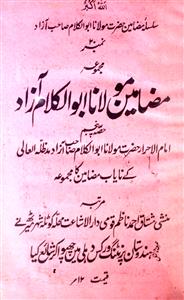
About The Author
Abul Kalam Azad was born at Mecca in 1888. He was named Mohuiddin Ahmed but his father, Maulana Syed Mohammad Khairuddin, liked to call him Feroze Bakht. His mother hailed from a family of well-respected scholars and his maternal grandfather was highly respected far and wide as a scholar. After receiving his early education from his father, Azad went for his higher education to Jamia Azhar at Cairo in Egypt where he was educated in Eastern systems of knowledge.
When he migrated from Arab to India, he chose Calcutta as his center of journalistic, scholastic, and political activities. Here, he started the first illustrated weekly called Al-Hilal in 1912 that projected a highly critical stance against the British government. Its impressive print run of fifty two thousand copies spoke volumes of its relevance and appeal. Finding it objectionable for themselves, the British banned its publication in 1914. Following this, he launched another publication called Al-Balagh which also reiterated Azad’s anti-British stance. While Azad had a clear stance against the British, he also projected a nationalist and patriotic stance and worked towards the cause of Hindu-Muslim unity. He also took to publishing other journals and newspapers like Paigham and Lisan-us-Sidq. He also remained associated with other publications like Wakeel and Amritsar. Maulana Azad was very active on the political front and took part in Non-Cooperation movement, Quit India movement, and Khilafat Movement. He had developed a sound camaraderie with Mahatama Gandhi, Dr. Mukhtar Ahmad Ansari, Hakim Ajmal Khan, and Ali brothers. Being deeply influenced by Gandhi’s philosophy of Non-Violence, he reposed complete faith in his leadership. This took him to travel the length and breadth of the country in order to propagate his ideas and ideals. Maulana Azad finally emerged as an important national leader. He was imprisoned for his anti-British stance during the freedom movement and served the cause of the nation as the President of the Congress party. His wife, Zuleikha Begum, stood as a pillar of strength all through his political endeavors of great trial and tribulation during country’s freedom struggle. This is how she is also counted as one of the ladies who contributed towards freedom struggle in their own ways.
After India’s independence, Maula Azad served as Education Minister and contributed significantly towards policy formation and establishment of education system in the country. University Grants commission and other technical, research, and cultural institutions stand as the testimony of his vision in the domains of liberal and technical education and culture.
Cumulatively, Maulana Abul Kalam Azad was a visionary politician, a major journalist, a remarkable prose stylist, and a notable commentator of the Holy Quran. He was also a poet and an essayist who wrote on several topics of contemporary relevance. His major works include Ghubaar-e-Khatir, Tazkira, and Tarjuman-ul-Quran. He wrote Ghubaar-e-Khatir during the days of his imprisonment at Ahmednagar fort. It contains all the letters that he wrote to Maulana Habibur Rahman Khan Sherwani. This is a good primary source to know about his life and preoccupations. Scholars and commentators have rightly acknowledged Maulana Azad as a genius of his age. This is how he was conferred with the most prestigious award of Bharat Ratna by the Government of India.
Maulana Azad passed away on February 02, 1958. He lies buried within the boundary of Jama Masjid in Urdu Bazar, Delhi.
More From Author
Read the author's other books here.
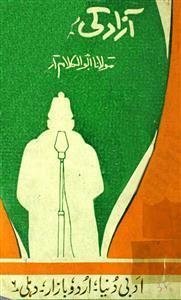
Aazad Ki Taqreeren
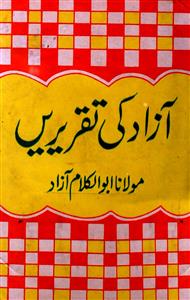
Aazad Ki Taqriren
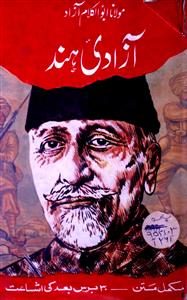
Aazadia-e-Hind
.
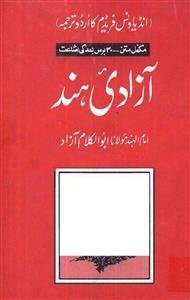
Aazadi-e-Hind
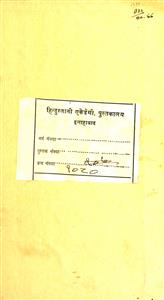
Aazadi-e-Islam
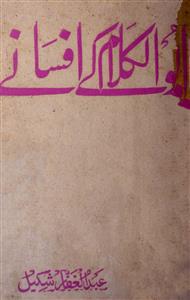
Abul Kalam Ke Afsane
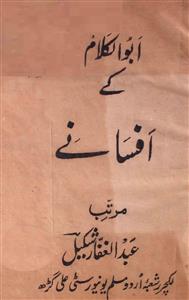
Addin Wassiyasat
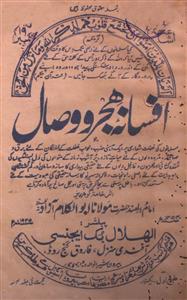
Afsana Hijr-o-Visal
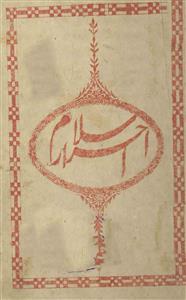
Ahrar-e-Islam
Popular and trending read.
Find out most popular and trending Urdu books right here.

Makhzan-e-Tasawwuf
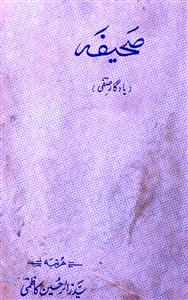
Nai Duniya Ko Salam And Jamhoor

Tazkira Atibba-e-Asr

Guru Nanak Dev

Akhbar-us-Sanadeed

Tilism-e-Hoshruba

Intikhab-e-sabras

Dr. Nazeer Ahmad Ki Kahani Kuchh Meri Aur Kuchh Unki Zabani
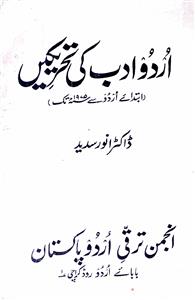
Urdu Adab Ki Tahreekein
Write a review.
Jashn-e-Rekhta | 8-9-10 December 2023 - Major Dhyan Chand National Stadium, Near India Gate - New Delhi
Rekhta Foundation
Devoted to the preservation & promotion of Urdu
Rekhta Dictionary
A Trilingual Treasure of Urdu Words
Online Treasure of Sufi and Sant Poetry
World of Hindi language and literature
The best way to learn Urdu online
Rekhta Books
Best of Urdu & Hindi Books
Essay on Maulana Abul Kalam Azad in English
Maulana Abul Kalam Azad: Maulana Abul Kalam Azad was an Indian poet, writer, journalist and scholar who became an important political leader of the Indian independence movement. In his youth, he adopted the pen name, ‘Azad’ and was popularly addressed simply as Maulana Azad.

Abul Kalam Azad was born in the year 1888 in Mecca, in modern-day Saudi Arabia, into a family of prosperous and learned Muslim scholars, or maulanas.
Maulana Abul Kalam Azad: The Legacy of a Great Indian
His forefathers hailed from Herat, in Afghanistan, and his lineage could be traced back to Babar’s days. Abul Kalam’s father’s name was Maulana Khairuddin, and his mother was the daughter of Sheikh Mohammad Zaher Watri.

In 1890, his father moved to Kolkata (formarly known as Calcutta). Educated according to the traditional curriculum, the young Kalam learnt Arabic and Persian at first and then philosophy, geometry, and algebra.
He was taught at home, first by his father, and later by appointed teachers who were eminent in their respective fields. Sensing that English was fast becoming the international language, Abul Kalam taught himself to read, write and speak the language.As he adapted to the changing opportunities of his time, he also adopted the pen name, “Azad” to signify his freedom from the traditional Muslim ways of his ancestors.
Maulana Abul Kalam Azad
The freedom of his mind turned him naturally towards the great enterprise of the day, the struggle for independence. Azad was introduced to the freedom struggle by revolutionary Shyam Sunder Chakravarthy. Most revolutionaries in Bengal were Hindus, and many were greatly surprised by his willingness to join the freedom struggle alongwith them, while others were skeptical of his intentions.
Azad also discovered that the revolutionary activities were mostly restricted to Bengal and Bihar. Creating his own niche within the movement, he helped to set up secret revolutionary centres all over North India and in Bombay (now Mumbai).
Easy Life Story Maulana Abul Kalam Azad
Most revolutionaries of the day were anti-Muslim, because they felt that the British Government was using the Muslim community against India’s freedom struggle.
Azad tried to convince his colleagues that indifference and hostility towards the Muslims would only make the path to freedom more difficult. Abul Kalam Azad began the publication of a journal called Al Hilal (The Crescent), in June 1912, to increase the revolutionary recruits amongst the Muslims.
The energy of his efforts paid off, and Al Hilal’s circulation passed 25,000 within two years, before the heavy hand of the British Government used the Press Act and then the Defence of India Regulations Act in 1916, to shut the journal down.
Undeterred, Azad continued his struggle, both for the Independence of India and his vision of an undivided nation in which people of all faiths would live harmoniously. From his earlier revolutionary ways, he now turned to Gandhiji’s popular Civil
Disobedience Movement and joined the Indian National Congress in January 1920. He presided over the special session of the Congress Party in September 1923 and at the age of 35, was the youngest man to be elected as the President of the Congress.
He was arrested in 1930, for violation of the salt laws as part of Gandhiji’s Salt Satyagraha. He was put in Meerut jail for a year and a half. As the British policies of ‘divide and rule’ gained roots in the nation’s social psyche, Azad remained the staunchest opponent of the partition of India.
Partition, he asserted, was against the grain of our nation’s culture, equal to “divorce before marriage! He supported a confederation of autonomous provinces with their own constitutions but common defence and economy, an arrangement suggested in the British Cabinet Mission Plan of May 1946.
Despite his exhortations to fellow Muslims in the pre- Independent India , he was unable to avert partition, which shattered his dream of a unified nation. He was unflinching in his opposition to it until the last, and is remembered best for this.
Following independence, Azad served as the Minister of Education in Jawaharlal Nehru’s cabinet from 1947 to 1958.
He died in August 1958. In 1992, the government of India posthumously awarded her patriotic son, the highest civilian honour – “the Bharat Ratna ’.
Easy Writing
Essay writing, subscribe to get the new updates, related articles.

J. R. D. Tata: The Man Who Changed the Course of Indian History

Annie Besant: The Life and Times of a Remarkable Woman

Don’t Want to Study : Why Study is Important in Our Life ? See
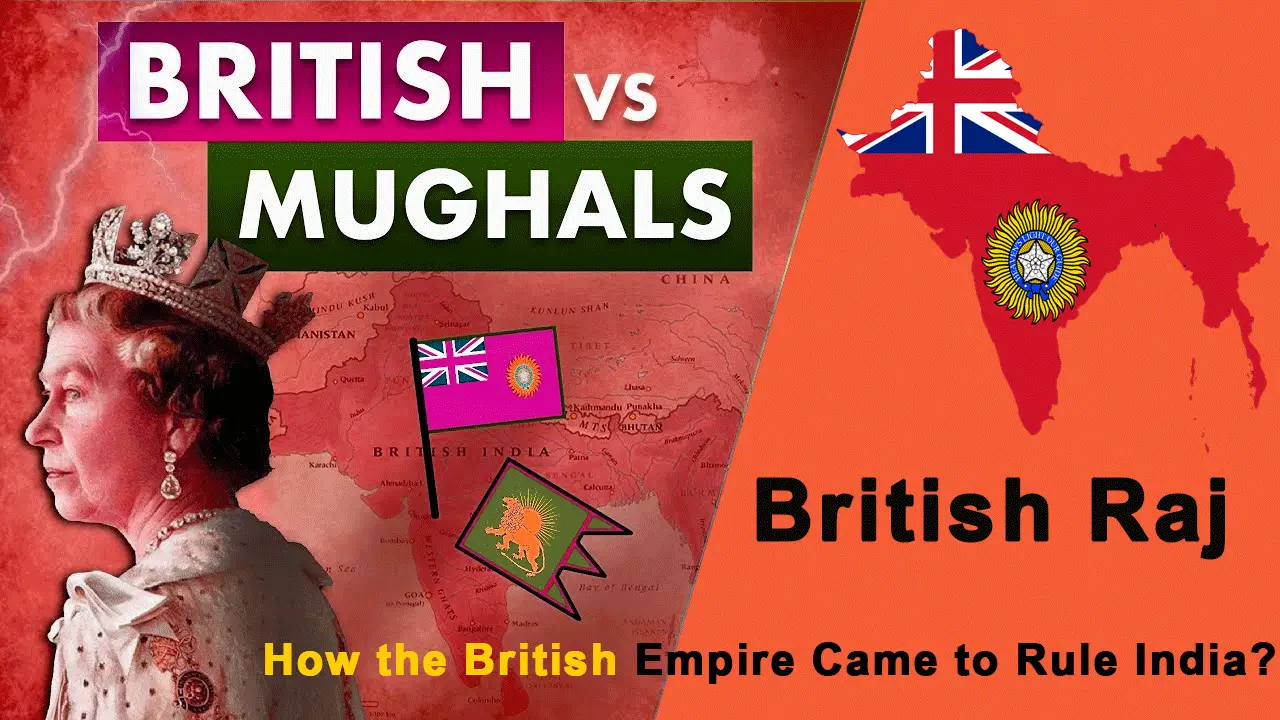
How British Empire Came to Rule India ? Important Story Essay Words
Leave a reply cancel reply.
Your email address will not be published. Required fields are marked *
Save my name, email, and website in this browser for the next time I comment.

IMAGES
VIDEO
COMMENTS
Maulana Azad. Abul Kalam Ghulam Muhiyuddin Ahmed bin Khairuddin Al- Hussaini Azad ( ( listen ⓘ); 11 November 1888 - 22 February 1958) was an Indian independence activist, writer and a senior leader of the Indian National Congress. Following India's independence, he became the First Minister of Education in the Indian government.
Abul Kalam Azad (born November 11, 1888, Mecca [now in Saudi Arabia]—died February 22, 1958, New Delhi, India) Islamic theologian who was one of the leaders of the Indian independence movement against British rule in the first half of the 20th century. He was highly respected throughout his life as a man of high moral integrity.. Azad was the son of an Indian Muslim scholar living in Mecca ...
Abdul kalam Azad, also known as Maulana Abdul kalam Azad or Maulana Azad was an Indian scholar, Islamic theologian, Senior leader of the Indian National Congress during the Indian Independence movement, and an independent activist. He was born on 11 November 1888 in Mecca and his full name is Abdul kalam Ghulam Muhiyuddin Ahmed bin Khairuddin ...
Maulana Abul Kalam Azad was born Abul Kalam Ghulam Muhiyuddin on November 11, 1888 in Mecca, Islam's main center of pilgrimage. ... and politics on his own. Maulana Azad had a natural inclination towards writing and this resulted in the start of the monthly magazine "Nairang-e-Alam" in 1899. He was eleven years old when his mother passed away ...
Maulana Abul Kalam Azad: Biography. Maulana Abul Kalam Azad was independent India's first education minister, and his birthday, 11 November, is celebrated as National Education Day. Read to know more about his life. Maulana Abul Kalam Azad was an educationist, freedom fighter, politician, and journalist. In his more than four-decade-long ...
Profile of Abul Kalam Azad. Abul Kalam Azad was born at Mecca in 1888. He was named Mohuiddin Ahmed but his father, Maulana Syed Mohammad Khairuddin, liked to call him Feroze Bakht. His mother hailed from a family of well-respected scholars and his maternal grandfather was highly respected far and wide as a scholar.
Maulana Abul Kalam Azad Biography. Maulana Abul Kalam Azad was born on 11 November, 1888 in Mecca, Saudi Arabia. He was a leading figure in India's struggle for freedom and a noted writer, poet ...
Maulana Abul Kalam Azad (1888-1958) - The Man and his Pen. ... Shariah, fiqh, philosophy, history, mathematics and tasawwuf. Even as a young lad of 12, he showed his aptitude for writing, starting a newsletter "Nairang-e-Alam" in 1899 and a weekly collection of poems "Al Misbah" in 1900. ... Maulana Abul Kalam Azad Biography in Hindi ...
Abstract. Maulana Abul Kalam Azad was a profound and rare Islamic scholar, writer, thinker, freedom fighter who promoted the idea of 'universal humanism'. He was well versed in poetry, art and music besides having a flair for writing. He was a multi-faceted personality with a progressive outlook. Though he had a rationalist outlook, he was ...
Azad began a career in journalism writing for Urdu newspapers, and in 1906 he became editor of the Amritsar newspaper Vakil, the best known Urdu newspaper of the time. He introduced literary and historical features, and wrote about events in Turkey and the Middle East. ... Correspondence between the Viceroy and Maulana Abul Kalam Azad ...
On 11 November 1888, freedom fighter Maulana Abul Kalam Azad was born in Mecca, present-day Saudi Arabia. He was a symbol of Hindu-Muslim unity, and a staunch opponent of the country's partition. Read more about the life and contribution of Maulana Azad for the IAS exam. The NCERT Notes for UPSC is an important asset for an all-round UPSC ...
3 Christian W. Troll, 'Abul Kalam Azad's Sarmad the Martyr', in Christopher Shackle, Urdu and Muslim South Asia: Studies in Honour of Ralph Russell (London, 1989), pp. 113-128, pp. 126-127. The translation of ' ghurbat ' in the phrase ' alam-i ghurbt-o-pareshānī ' should be 'exile' (in alien land).
Introduction. Maulana Azad is prominent in history of modern India as an expert on Indian culture, poet, philosopher, writer, educationist, politician, and architect of Indian education system. Even he was also a great champion of secularism and national integration.1 His real name is Abdul Kalam Ghulam Muhiyuddin Ahmed Bin Khairuddin Al ...
11/Nov/2023. Maulana Abul Kalam Azad was a stalwart of the freedom struggle who stood out amongst a galaxy of leaders on account of his intellectual prowess and deep commitment to the nationalist ...
Abul Kalam Azad collection of short stories, articles, and ebooks in Urdu, Hindi & English. ... Biography 86. Children's Literature 20. Compiled 165. Criticism 1270. Dastaan 19. Dictionary 7. Drama 26. ... Aasar-e-Azad. National Archives Mein Mahfooz Maulana Aazad Ki Nadir Tahreeren. 1990. Aasar-e-Azad . 1988. Aasar-o-Nuqoosh . 1997. Aazad Ki ...
Maulana Abul Kalam Azad - UPSC Notes. Maulana Abul Kalam Azad, popularly known as Maulana Azad was the first Education minister of Independent India. A senior leader of the Indian National Congress and an important figure of the Nationalist movement, he was also a renowned scholar and debater, well versed in English, Hindi, Arabic, Persian, etc.
noble lady was Maulana Abul Kalam Azad born on 11th November, 1888. Thus from both of his parents, Maulan Azad inherited the grand legacy of learning. "I have had the privilege of being associated with Maulana Abul Kalam Azad in national work since 1920. In the knowledge of Islam, he is surpassed by no one. He is a profound Arabic scholar.
biography of abul kalam azad. India World Opinion Sports e-Paper Menu; Shorts Data Health ... (1888-1958), aka Maulana Abul Kalam Azad which translates as 'the liberated father of discourse ...
Even today two journalists will hardly agree when writing on an event occurring at the distance of only a few miles. Who knows what were the true ... Maulana Abul Kalam Azad (Rampur, 1968), pp. 285 and 289-290. 3 Christian W. Troll, 'Abul Kalam Azad 's Sarmad the Martyr, in Christopher Shackle, Urdu and Muslim South Asia:
Welcome to my channel Complete English Lessons.Biography writing/Maulana Abul Kalam Azad/Paragraph Writing class 10 lesson3 class 10 english chapter 3 exerci...
An icon used to represent a menu that can be toggled by interacting with this icon.
Cumulatively, Maulana Abul Kalam Azad was a visionary politician, a major journalist, a remarkable prose stylist, and a notable commentator of the Holy Quran. He was also a poet and an essayist who wrote on several topics of contemporary relevance. His major works include Ghubaar-e-Khatir, Tazkira, and Tarjuman-ul-Quran.
Easy Writing. Maulana Abul Kalam Azad: Maulana Abul Kalam Azad was an Indian poet, writer, journalist and scholar who became an important political leader of the Indian independence movement. In his youth, he adopted the pen name, 'Azad' and was popularly addressed simply as Maulana Azad. Abul Kalam Azad was born in the year 1888 in Mecca ...